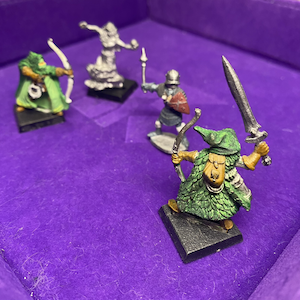How I Conduct Podcast Prep Calls

It can be fun to go into an interview cold – there’s an appealing energy that comes from the uncertainty of not knowing what’s going to happen next. That’s also why I enjoy role-playing games so much. As a DM, you can set up a combat encounter or introduce an NPC, then embrace the chaos as players hurl their characters in completely unexpected directions. Combine that with merciless randomness of dice rolls and you have a recipe for grand amusement.
But it’s also helpful to plan for chaos, whether from a dungeoncrawl or interview.
Prep calls are essential to making an interview entertaining and informative. Ideally, it’s a conversation that feels dynamic and natural. The worst thing to do is ask a question, passively wait for an answer, ignore the sense of that answer, and carry on to the next question.
Here’s a rough outline of my approach:
- Be flexible. Explore the topics the guest is passionate about and knowledgeable of. Sometimes we’ll start with one topic, only to discover a tangent that would be more interesting.
- Use open-ended questions to prompt clear explanations or strong opinions. It takes practice to reformulate questions from yes/no formulas into “why” or “how” ones that generate conversations.
- Probe for interesting or unique insights. This may also reveal areas to avoid. It’s hard to give specific examples here since it relies on the context of the topic, but I usually find questions based on “What does that mean for X?” or “Why does that matter?” works well.
- Anecdotes are good. If responses tend to be generalities or platitudes, ask for examples of the topic in practice, such as how they’ve seen a problem solved, a tool implemented, or a strategy succeed.
- Anecdotes of lessons learned from mistakes are also good. Plus, failures are often entertaining. Here I pay attention to the tone of the answer. Something like, “They were all idiots,” isn’t really helpful or educational. Something like, “We didn’t anticipate X” or “We tried to apply a process for X when it’s better for Y” is more useful.
- Listen for themes or framing devices as they answer.
During the prep I skip around a lot as I build a picture, but in the interview I’ll try to stick to themes and a flow that builds a story. Stories and conversations are more engaging than dry Q&A. This also means I may reorder questions from how we went through them in the prep call.
![]()
Ultimately, I look for some sort of narrative in terms of problem, complication, and solution or background, conflicts, and resolution. Some examples might be:
- What’s the problem? Why is it such a problem? How should we think of solutions?
- You tried X, then Y. You learned Z. In hindsight, what would you do differently?
One of the traps of asking too many followup questions or searching for a narrative is that it may constrain the guest to a rigid path. They have insights and knowledge to share. Let them reveal what that is rather than trying to guess it through questions. Thus, I always ask, “Is there something we didn’t cover that you want to mention?”
If they seem likely to be nervous during the interview, I’ll repeat some seed questions so they have an idea of what to expect.
Finally, I explain that we’ll close out the segment with a call to action or shout out of their choice. I’ll ask what they’re working on or what they want to draw attention to. Sometimes this also helps me refine questions during the interview so they build up to this point.
To recap, I go into every prep call with a plan to:
- Ask what they’re passionate about.
- Ask many short questions to gather context and background so the subsequent interview can be a more natural conversation.
- Develop a narrative arc.
- During the interview, actively listen to the guest’s responses and use them to flow into followup questions.
The way I prep for interviews is closely tied to the format we use on ASW. They’re intended to highlight the guest’s expertise, put them in a good light, understand their opinions, and draw out their personality. If the format were different, I’d keep many of the principles, but would adjust as necessary to the context. But in every case, being prepared makes for a better interview and, perhaps surprisingly, one that can be even more spontaneous.
For more about how I approach the podcast, check out the style guide.